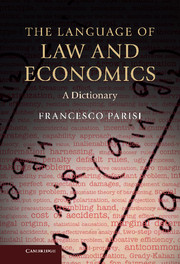W
Published online by Cambridge University Press: 04 August 2017
Summary
Warranties: the law and economics literature considers a warranty as a promise of the seller to assume specific responsibilities in case the quality or the performance of the purchased item does not conform to the specifications and the legitimate contractual expectations of the buyer. Warranties can be conventional (i.e., chosen and made into a contract by the contracting parties) and legal (i.e., created by operation of law). From an economic point of view, three main functions are played by legal and conventional warranties: (a) the information-revealing function; (b) the incentive function; and (c) the insurance function. As has been shown in the literature, the pursuit of these three functions is not always possible with the choice of a single warranty instrument. With respect to the information-revealing function, the main idea is that most consumer transactions are chronically affected by asymmetric information, whereby sellers are assumed to have a natural advantage in gathering information concerning the true quality of the sold item. In the presence of asymmetric information, the seller’s willingness to offer a warranty is a credible signal of the information available to the seller. Through the mechanism of contractual warranties, sellers of products of different quality will be able to offer easily observable and credible information to potential buyers. Buyers may also possess private information that is not available to the seller. The demand for warranties by buyers could also signal the existence of private information on the part of the consumer, namely the expected level of harm that he or she faces in the event of product failure. Highly sensitive consumers will demand more warranties, while low-sensitivity buyers may forgo the warranty in return for a discount. In addition, in this case, the contractual choice of a warranty may serve a socially valuable signaling function.
- Type
- Chapter
- Information
- The Language of Law and EconomicsA Dictionary, pp. 315 - 321Publisher: Cambridge University PressPrint publication year: 2013



